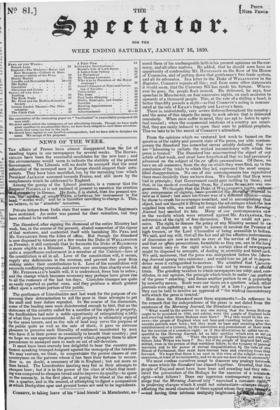The gentlemen of Lincolnshire met last week for the purpose
of ex- pressing their determination to aid the poor in their attempts to get the malt and beer duties repealed. In the course of the discussion, some of the leading men were disinterested enough to hint, that as the distresses of the country called for a sacrifice of the rights of property, the fundholders had now a noble opportunity of relinquishing a little of whit they have accumulated. As all property is ultimately enjoyed by the same tenure, and as the sale of land may serve the purpose of the public quite as well as the sale of stock, it gave us extreme pleasure to perceive such liberality of sentiment manifested by men who have it in their power so essentially to benefit their country; and we hope we can appreciate the generosity which prompts them to allow precedence to moneyed men in such an act of self-devotion. It must have been scarcely less delightful to hear the country gen- tlemen speaking trumpet-tongued against the monopoly of the brewers. We may venture, we think, to congratulate the poorer classes of our countrymen on the patrons whom it has been their fortune to secure. Beer is, no doubt, a necessary of life in England; but not more so than bread. The Lincolnshire meeting may fail in their attempts to cheapen beer; but it is in the power of the class of which that meet- ing was composed to cheapen bread and to improve its quality—to spare Us the necessity, in the first place, of paying for wheat at the rate of 84. a quarter, and in the second, of attempting to digest a composition 41'Which Derbyshire spar and ground bones are said to be ingredients.


















